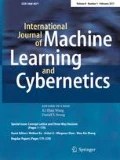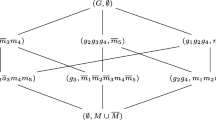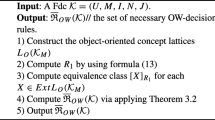Abstract
Rule acquisition is one of the main purposes in the analysis of decision formal contexts. Up to now, there have existed several types of rules (e.g., the decision rules and the granular rules) in decision formal contexts. This study firstly proposes a new algorithm with less time complexity for deriving the non-redundant decision rules from a decision formal context. Then, we invesigate decision rules and the granular rules in the consistent decision formal contexts and make a contrast between the decision rule oriented knowledge reduction and the granular rule oriented knowledge reduction. Finally, some experiments are conducted to assess the efficiency of the proposed rule acquisition algorithm.


Similar content being viewed by others
References
Wille R (1982) Restructuring lattice theory: an approach based on hierarchies of concepts. In: Rival I (ed) Ordered sets. Reidel, Dordrecht, pp 445–470
Zhang WX, Wei L, Qi JJ (2005) Attribute reduction theory and approach to concept lattice. Sci China Ser F 48(6):713–726
Liu M, Shao MW, Zhang WX, Wu C (2007) Reduction method for concept lattices based on rough set theory and its applications. Comput Math Appl 53(9):1390–1410
Wang X, Zhang WX (2008) Relations of attribute reduction between object and property oriented concept lattices. Knowl Based Syst 21:398–403
Medina J (2012) Relating attribute reduction in formal, object-oriented and property-oriented concept lattices. Comput Math Appl 64(6):1992–2002
Li TJ, Wu WZ (2011) Attribute reduction in formal contexts: a covering rough set approach. Fund Inform 111:15–32
Mi JS, Leung Y, Wu WZ (2010) Approaches to attribute reduction in concept lattices induced by axialities. Knowl Based Syst 23(6):504–511
Wei L, Qi JJ (2010) Relation between concept lattice reduction and rough set reduction. Knowl Based Syst 23(8):934–938
Cherukuri AK, Srinivas S (2010) Concept lattice reduction using fuzzy K-means clustering. Expert Syst Appl 37(3):2696–2704
Ganter B, Wille R (1999) Formal concept analysis: mathematical foundations. Springer, New York
Guigues JL, Duquenne V (1986) Famille minimales d’implications informatives résultant d’un tableau de données binaries. Math Sci Hum 95:5–18
Luxenburger M (1991) Implications partielles dans un contexte. Math Sci Hum 113:35–55
Dodin R, Missaoui R (1994) An incremental concept formation approach for learning from databases. Theor Comput Sci 133:387–419
Valtchev P, Missaoui R, Godin R (2004) Formal concept analysis for knowledge discovery and data mining: the new challenge. In: Proceedings of the 2004 international conference on formal concept analysis, Sydney, Australia, pp 352–371
Qu KS, Zhai YH (2008) Generating complete set of implications for formal contexts. Knowl Based Syst 21:429–433
Pasquier N, Bastide Y, Taouil R et al (1999) Efficient mining of association rules using closed itemset lattices. Inform Sci 24(1):25–46
Zaki MJ (2004) Mining non-redundant association rules. Data Min Knowl Disc 9:223–248
Cherukuri AK (2012) Fuzzy clustering based formal concept analysis for association rules mining. Appl Artif Intell 26(3):274–301
Zhang WX, Qiu GF (2005) Uncertain decision making based on rough sets. Tsinghua University Press, Beijing
Qu KS, Zhai YH, Liang JY et al (2007) Study of decision implications based on formal concept analysis. Int J Gen Syst 36(2):147–156
Shao MW (2007) Knowledge acquisition in decision formal contexts. In: Proceedings of the sixth international conference on machine learning and cybernetics, Hong Kong, pp 4050–4054
Wu WZ, Leung Y, Mi JS (2009) Granular computing and knowledge reduction in formal contexts. IEEE Trans Knowl Data Eng 21(10):1461–1474
Li J, Mei C, Lv Y (2011) A heuristic knowledge-reduction method for decision formal contexts. Comput Math Appl 61(4):1096–1106
Li J, Mei C, Lv Y (2011) Knowledge reduction in decision formal contexts. Knowl Based Syst 24(5):709–715
Li J, Mei C, Lv Y (2012) Knowledge reduction in formal decision contexts based on an order-preserving mapping. Int J Gen Syst 41(2):143–161
Song XX, Wang X, Zhang WX (2012) Independence of axiom sets characterizing formal concepts. Int J Mach Learn Cybern. doi:10.1007/s13042-012-0110-z
Kent RE (1994) Rough concept analysis. In: Ziarko WP (ed) Rough sets, Fuzzy sets and knowledge discovery. Springer, London, pp 248–255
Yao YY (2004) Concept lattices in rough set theory. In: Proceedings of 2004 annual meeting of the north American fuzzy information processing society, Banff, Canada, pp 796–801
Düntsch I, Gediga G (2003) Approximation operators in qualitative data analysis. In: Swart H et al (eds) Theory and applications of relational structures as knowledge instruments, Lecture Notes in Computer Science, vol 2929. Springer, Berlin, pp 214–230
Wei L, Qi JJ, Zhang WX (2008) Attribute reduction theory of concept lattice based on decision formal contexts. Sci China Ser F 51(7):910–923
Pei D, Mi JS (2011) Attribute reduction in decision formal context based on homomorphism. Int J Mach Learn Cyber 2(4):289–293
Wang H, Zhang WX (2008) Approaches to knowledge reduction in generalized consistent decision formal contexts. Math Comput Model 48:1677–1684
Fielding AH (2007) Clustering and classification techniques for the biosciences. Cambridge University Press, London
Frank A, Asuncion A (2010) UCI machine learning repository [http://archive.ics.uci.edu/ml]. Irvine, CA: University of California, School of Information and Computer Science
Pei D, Li MZ, Mi JS (2011) Attribute reduction in fuzzy decision formal contexts. In: International conference on machine learning and cybernetics. IEEE Press, New York, pp 204–208
Li J, Mei C, Lv Y (2013) Incomplete decision contexts: approximate concept construction, rule acquisition and knowledge reduction. Int J Approx Reason 54(1):149–165
Li J, Mei C, Lv Y (2012) Knowledge reduction in real decision formal contexts. Inform Sci 189:191–207
Li J, Mei C, Lv Y, Zhang X (2012c) A heuristic knowledge reduction algorithm for real decision formal contexts. In: Yao JT et al (eds) Proceedings of RSCTC, Lecture Notes in Artificial Intelligence, vol 7413. Springer, Berlin, pp 303–312
Yang HZ, Leung Y, Shao MW (2011) Rule acquisition and attribute reduction in real decision formal contexts. Soft Comput 15(6):1115–1128
Acknowledgments
The authors would like to thank the anonymous reviewers for their valuable comments and helpful suggestions which lead to a significant improvement on the manuscript. This work was supported by the National Natural Science Foundation of China (Nos. 10971161, 61005042, 11071281 and 61202018).
Author information
Authors and Affiliations
Corresponding author
Rights and permissions
About this article
Cite this article
Li, J., Mei, C., Kumar, C.A. et al. On rule acquisition in decision formal contexts. Int. J. Mach. Learn. & Cyber. 4, 721–731 (2013). https://doi.org/10.1007/s13042-013-0150-z
Received:
Accepted:
Published:
Issue Date:
DOI: https://doi.org/10.1007/s13042-013-0150-z




